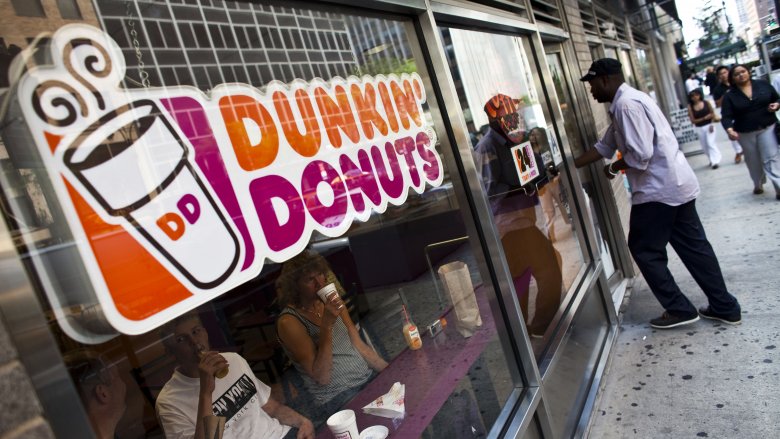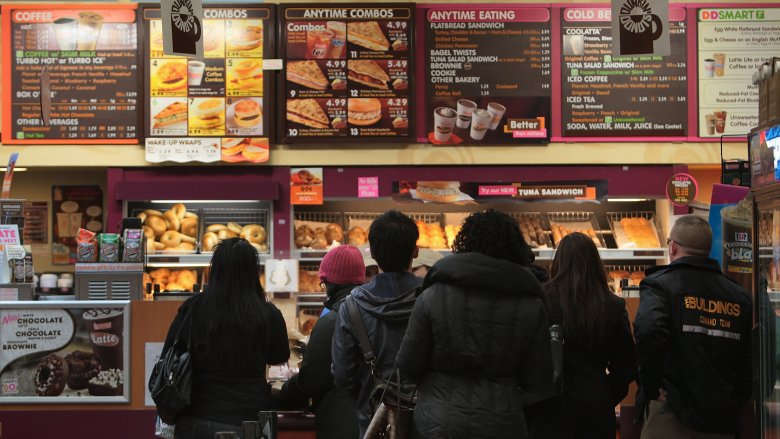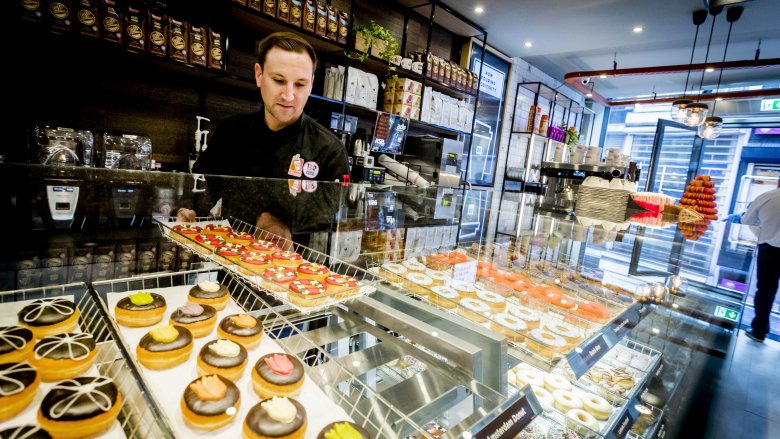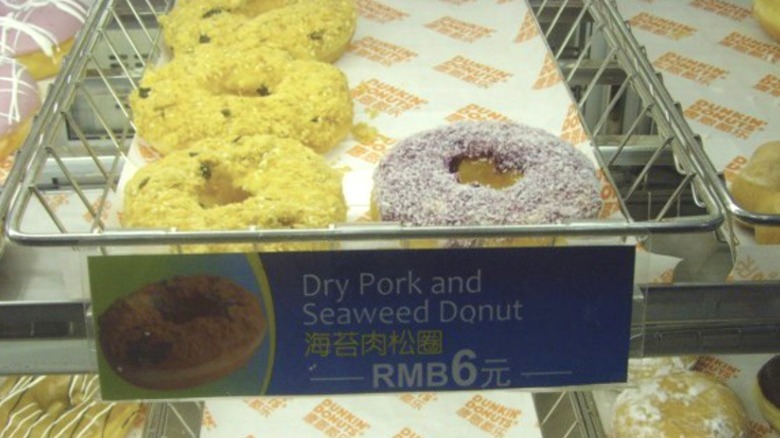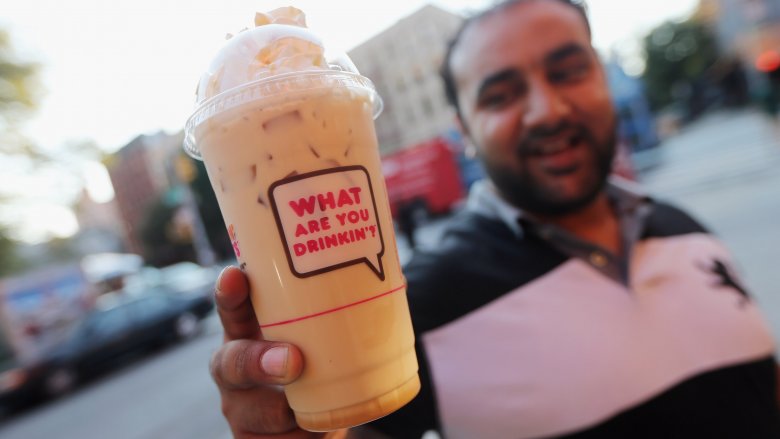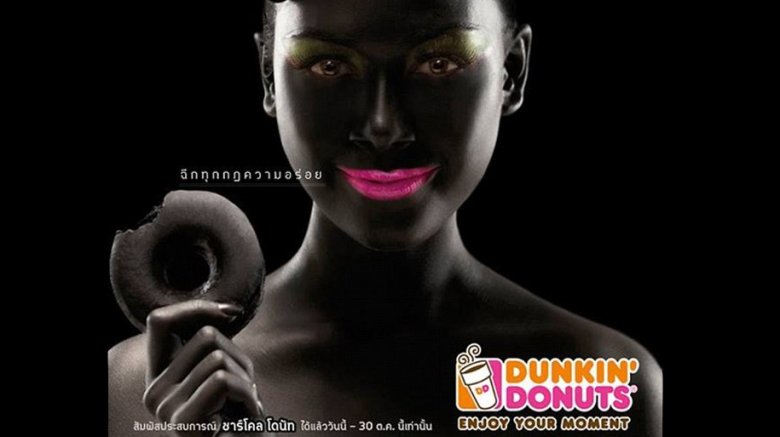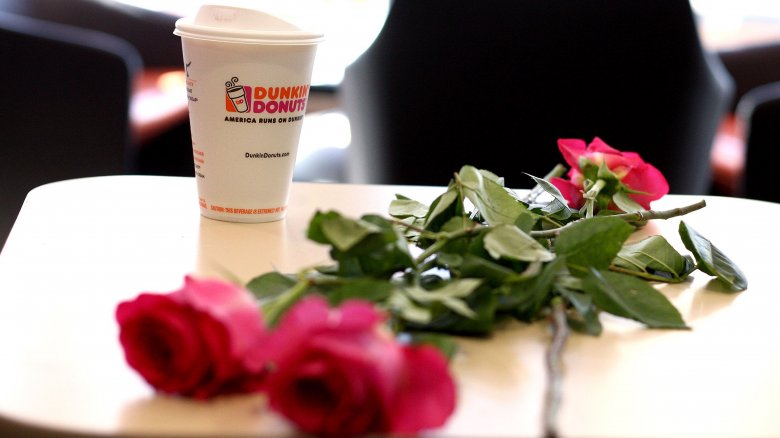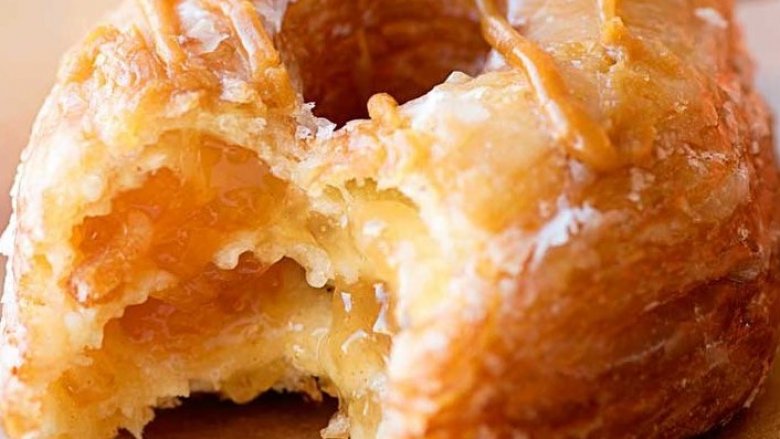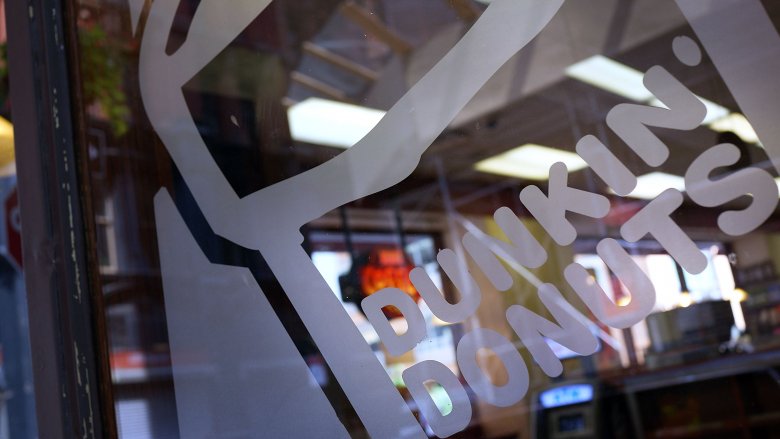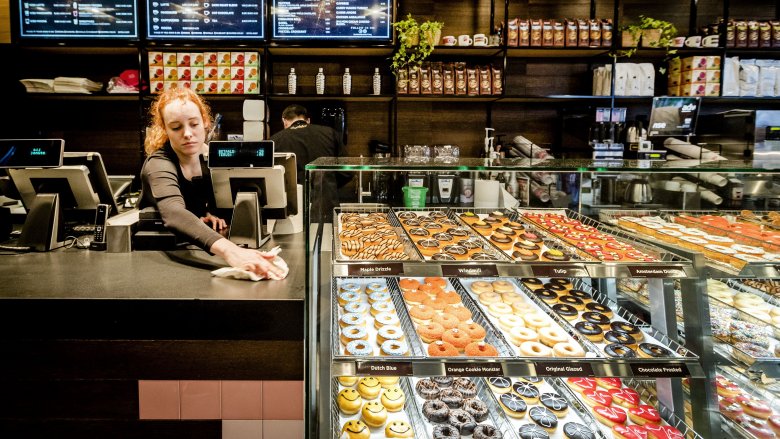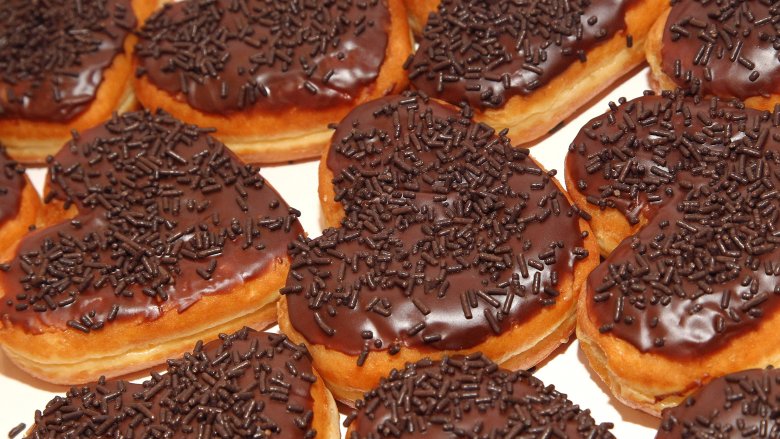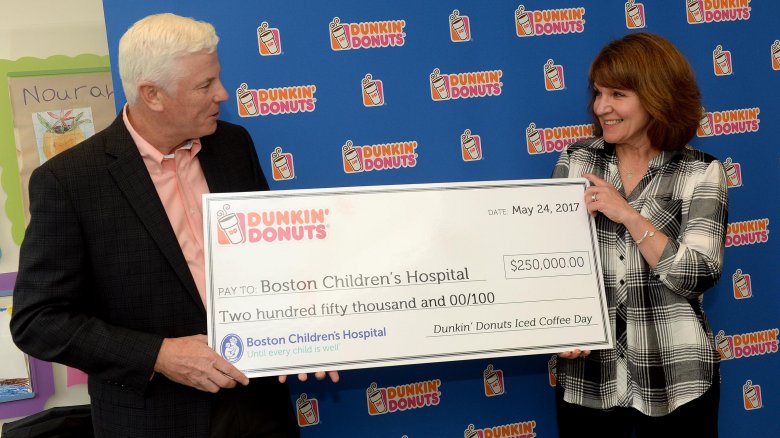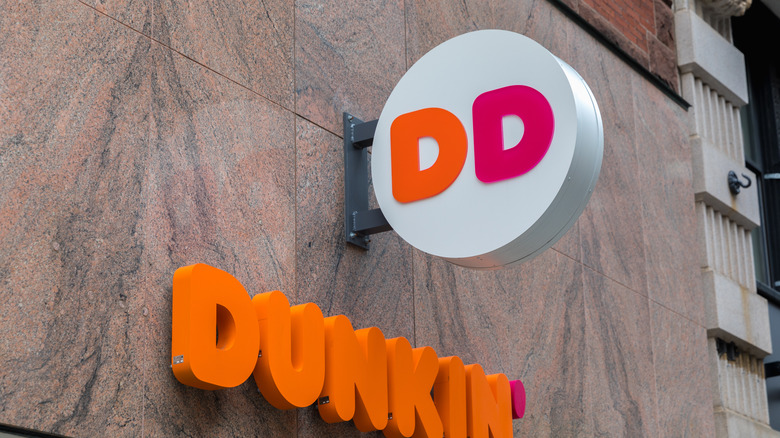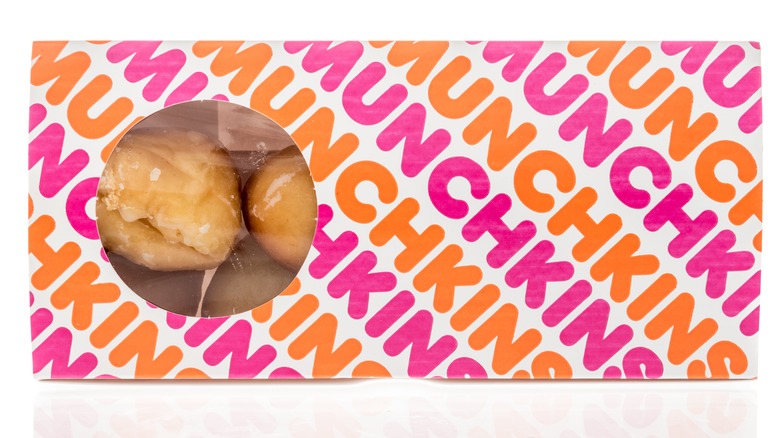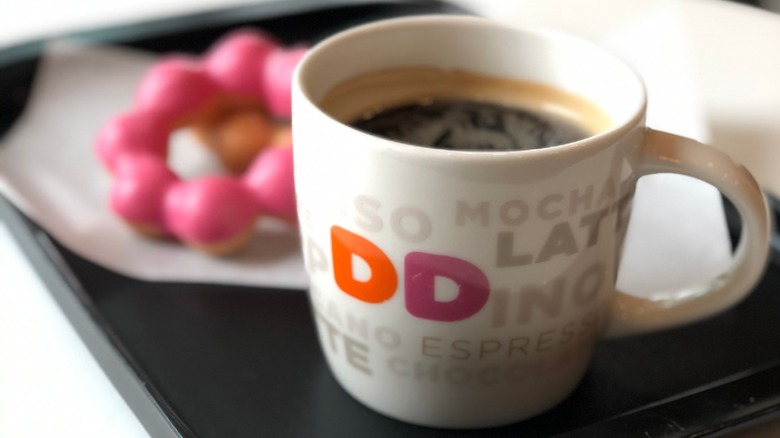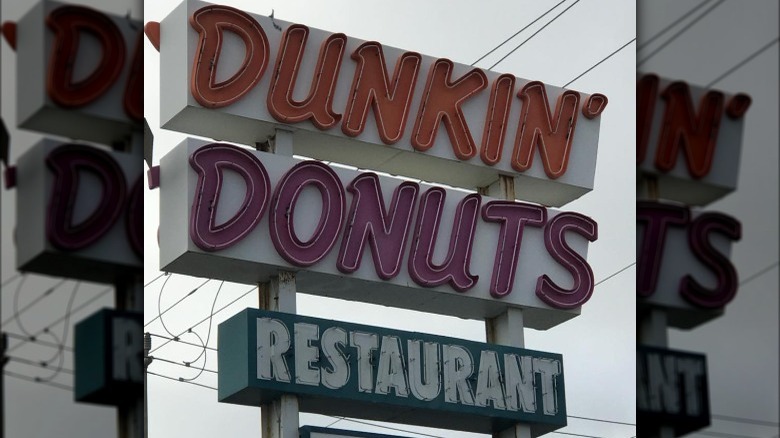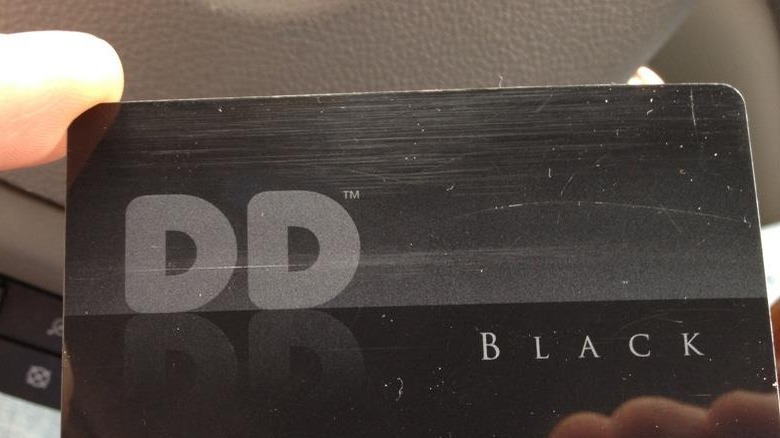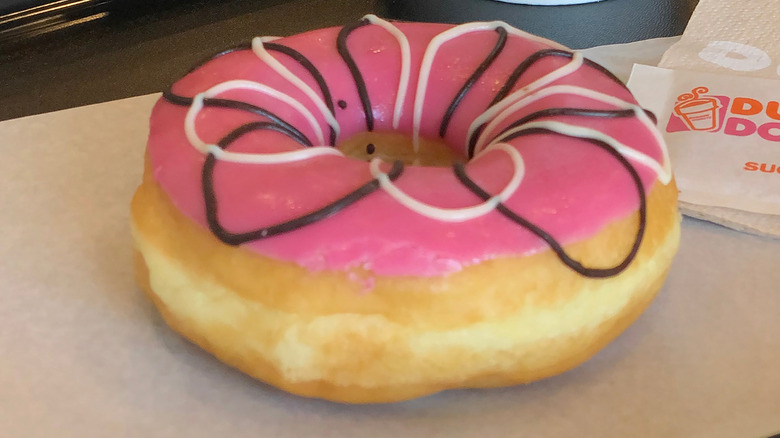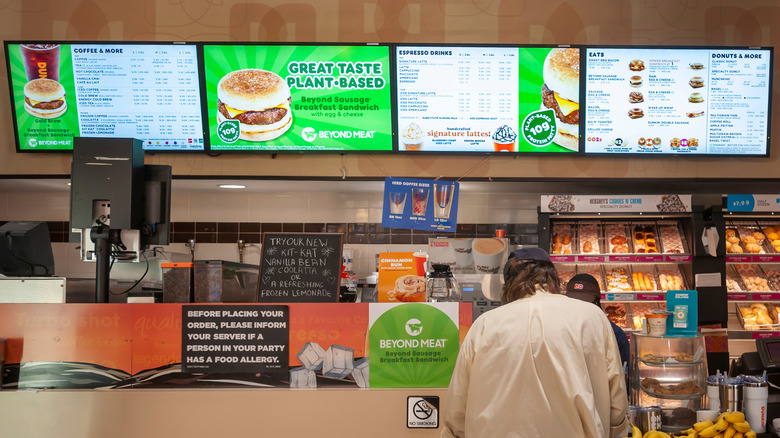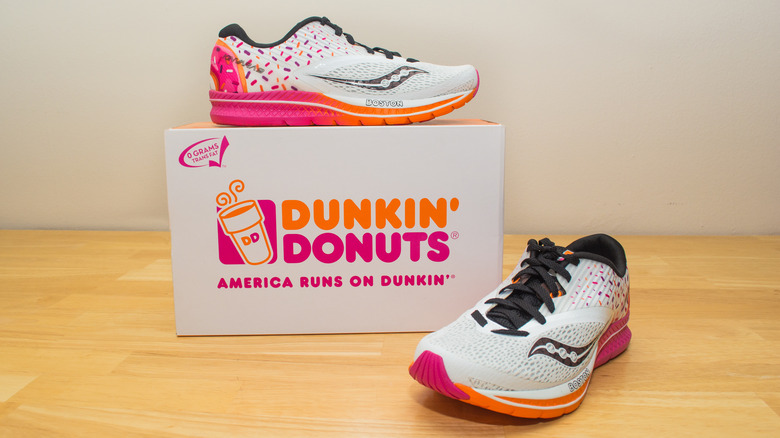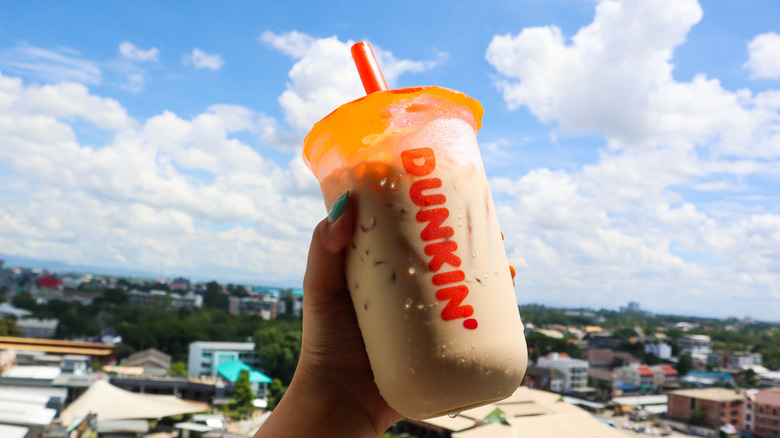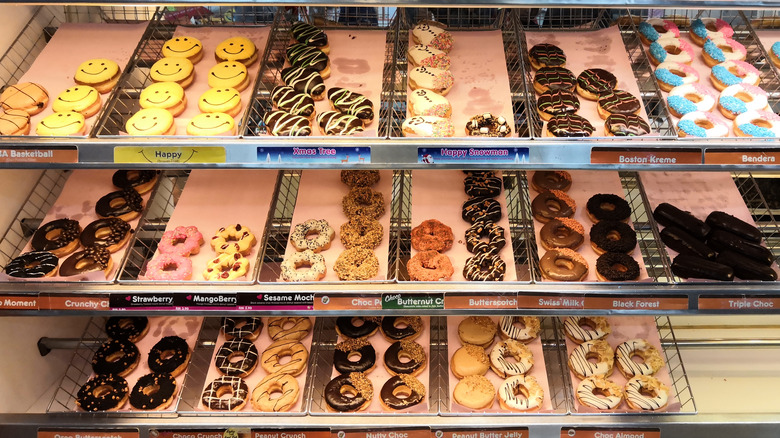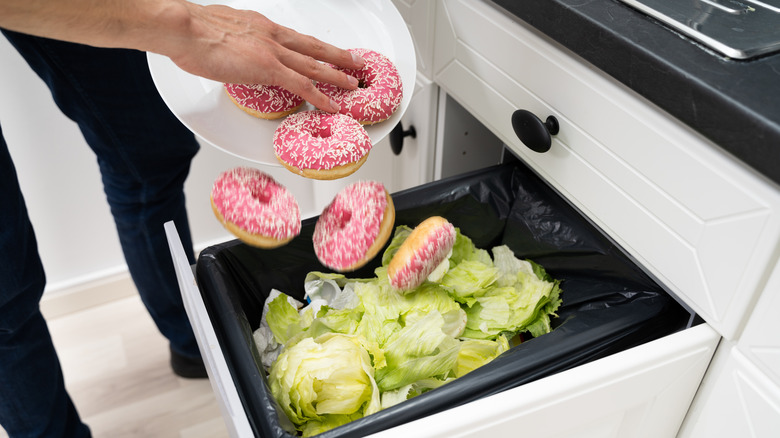The Untold Truth Of Dunkin' Donuts
They say "America Runs on Dunkin'," and that's no joke. In 2018, CNN reported Dunkin' Donuts was looking to the future, and it was a bright one filled with a lot more locations. After a revamp, refocus, and a little polish to the concept, the final part of the plan was to open 9,000 more stores and double the number of locations to around 18,000 total. Sounds like a lot, sure, so let's put that in perspective: Starbucks only has a tad over 15,000 stores, and they're everywhere.
It's all about the convenience for Dunkin', and cashing in on that early morning rush, the time you probably most often find yourself sitting in a Dunkin' drive-thru, eagerly waiting for the caffeine pick-me-up of a giant cup of coffee and possibly the sugar rush that comes with one of its donuts. There's a lot that's changed at Dunkin' since its early days — but even if you've been a devoted Dunkin' fan for years, there are undoubtedly still some things you don't know about this favorite chain.
It started very small
Dunkin' Donuts was founded by William Rosenberg, and he's a pretty fascinating individual. He grew up in Depression-era Massachusetts, and after the family grocery store went out of business, he dropped out of the 8th grade and went to work to help support his family. He shined shoes, shoveled snow, and made a fortune when he started buying huge blocks of ice and turning them into ice chips he sold at a local racetrack.
Later, he sold ice cream out of a truck and worked at a war-era shipyard, then turned the profits he made off war bonds into a post-war food truck business that specialized in hitting construction sites. He built his own vehicles and created the now-familiar concept of the food truck with the roll-up sides.
Rosenberg's biggest sellers were coffee and donuts, so he decided that was the direction he was going to go. He started with 52 donuts — one for every week — and opened a place called Open Kettle in Quincy, Massachusetts. It was his architect who came up with the new name of Dunkin' Donuts, and the rest is history.
It popularized revolutionary business practices
Inc. says Dunkin' was a massive success right from the beginning, and Rosenberg opened six more stores within five years. At the time, franchising was seen as a bit of a shady practice, but Rosenberg saw it as a brilliant business template that allowed for some serious growth. It caused controversy for him, too. According to his biography at the University of New Hampshire's Rosenberg International Franchise Center, he originally went into business with his brother-in-law, Harry Winouker. The two fell out over franchising, and while Rosenberg kept Dunkin', Winouker kept their other stores under the Mister Donut name.
Rosenberg went on to help normalize franchising, and in 1959 he started the International Franchise Association. At the time, franchising had such a negative connotation there was legislation in the works to make it illegal, but Rosenberg's association pushed back and changed the way the nation did business.
It has been accused of using fake ingredients
Dunkin' has gotten in more than its fair share of trouble for questionable ingredients, and there's been several lawsuits over what some consumers considered false advertising, with 2017 being a particularly bad year for the chain.
In March, The Boston Globe reported a Worcester man sued two different groups of area Dunkin' franchises for replacing butter with margarine or another butter substitute. The grand deception had been going on since 2012, he claimed, and even though his attorneys even acknowledged the world had bigger problems, they also said it was important to hold businesses accountable for selling exactly what they're advertising. At the end of the case, the 10 people who brought the suit got $500 each, while the attorneys walked away with a cool half million.
In June 2017, the company was sued because the meat in its steak-and-egg breakfast sandwich was beef, not steak, and in July of that year, another suit was filed over the blueberry donuts. Consumerist says the basis of the lawsuit is that the blueberries in their items aren't actually blueberries, they're "blueberry flavored bits" (And, to be fair, most blueberry-flavored things you buy contain bits instead of berries, as we discovered here.)
Dunkin' has an interesting menu in China
Everyone has their favorite donuts, whether they're the ones with sprinkles and cream filling or a simple glaze. Finding your local Dunkin' just put out a fresh tray of your favorite means it's going to be a good day, but if you happen to head to China, don't expect to find many familiar flavors in Dunkin'.
According to The Boston Globe, Dunkin' made a serious push into China in 2016 after failing twice before. Its 20-year rollout plan included 1,400 stores and plans to revamp donuts to cater to the tastes of local customers, and that means some flavors that look unfamiliar to American eyes. Since sweet treats for breakfast don't hit the sweet spot in China, the menu got a makeover to include donuts sprinkled with dried pork floss. Sweet donuts you won't find Stateside include the Smile, a banana creme donut that looks like a smiley face emoji (via The Beijinger).
The founder had to stop eating donuts later in life
At the time William Rosenberg opened the first Dunkin' Donuts stores, the amount of variety served by Dunkin' was unheard of. The typical donut shop offered only four varieties, while Rosenberg put 52 on offer.
You'd think the man must have loved his donuts, and you'd be right. When Rosenberg passed away in 2002 (the official cause was bladder cancer, and at the time, he was also a survivor of lung, skin, and blood cancers), his Los Angeles Times obituary said he'd often joke that if no one was looking, he could polish off two dozen donuts in a sitting. But when people were looking, he was good. He'd been cutting back on his intake due to weight issues and years of being a diabetic, and while he tended to pass on his chain's donuts, he still started every day with a fresh cup of Dunkin's coffee.
Dunkin' ran a blackface ad in 2013
You expect one of "SNL's" parody commercials to be cringey, but in 2013, Dunkin' made its own, very real, very uncomfortable ad that got the company in all kinds of trouble. According to The Guardian, Dunkin' was quick to apologize for the ad, which was actually the brainchild of a franchisee in Thailand. The ad was for their charcoal donut and featured a woman with a beehive, bright pink lipstick, and full blackface.
Per The Guardian, The Associated Press noted it's not really anything out of the ordinary for advertising campaigns in Thailand, but the group Human Rights Watch called it out for being "both bizarre and racist." Dunkin's CEO for Thailand, Nadim Salhani, had the most baffling response you can imagine. He defended the ad, saying, "We're not allowed to use black to promote our donuts? I don't get it. What's the big fuss? What if the product was white and I painted someone white, would that be racist?" Even stranger, it's also worth noting that the model in the ad is Salhani's teenage daughter.
Donut is a legitimate, correct spelling
Would a donut of any other spelling taste as sweet? Yes, says Merriam-Webster, and here's why.
"Donut" is actually a variant of the word "doughnut," and it started showing up in common usage in the middle of the 20th century, but there's a well-established tradition that created it. Benjamin Franklin and Noah Webster — of the dictionary-writing Websters — championed something called phonetic-based spelling reform. It's basically the idea it's easier to spell things the way they sound, and "donut" actually makes a lot more sense than the more official "doughnut."
HuffPost adds that the first printed version of the word was actually "dough-nut," and says Washington Irving referred to them by another name: oly koeks (or oily cakes). They also say that Dunkin' Donuts was the one largely responsible for the popularity of this spelling, as it skyrocketed around the time the chain was founded. It's infinitely better than Dunkin' Oily Cakes.
It's not a cronut
Remember the hype around the cronut? The half-croissant, half-donut hybrid was the brainchild of pastry chef Dominique Ansel, and according to The Guardian, it wasn't long after the Cronut's May 2013 launch that Ansel had news crews documenting the lines forming outside his bakery. It was revolutionary, and when Dunkin' Donuts announced its own croissant-donut hybrid, the brand was quick to add it definitely wasn't a cronut.
Dunkin's Croissant Donut hit shelves on November 3, 2014, and Dunkin's president of global marketing and innovation, Joe Costello, told NBC News that a huge part of the company's business involved tracking industry trends, and there had been a decades-long, nationwide trend of bakeries combining the two pastries. Costello told them, "Are we copying a specific bakery in New York? The answer is no."
Interestingly, NBC also noted that the domestic Croissant Donut came almost a year after Dunkin' introduced the product to its South Korean stores, where it was called a New York Pie Donut.
Dunkin' brewed its own beer
There's not much that's better than a donut and a hot cup of coffee, but a donut and a beer might be a very close second. In 2017, Dunkin' joined forces with Worcester's Wormtown Brewery to create a donut-inspired dark beer brewed from their coffee. According to CBS Boston, the beer was carefully designed to go perfectly with Dunkin's Double Chocolate Cake Donut, and it was called the DDark Roasted Brew. The limited edition beer was, sadly, only available at the brewery's own tap room, and they held a public keg tapping on the winter solstice to celebrate the partnership. Sales of the draught beer made from Dunkin's Dark Roast Coffee started at 11:28 a.m. on the solstice, and seriously, is there a better way to celebrate the end of the world's descent into longer and longer winter nights?
It was all for a good cause, too. Wormtown and the local Dunkin' franchisee, Rob Branca, took the opportunity to make a $11,500 donation to the local food bank.
They've offered an insane number of varieties
Rosenberg started off with 52 varieties of donuts, but you might not find that many at your local Dunkin'. How many are there, anyway?
Officially (according to Boston.com), Dunkin' has 22 staple varieties that are the ones you're pretty much guaranteed to find at any location, at any time. Those are the kinds like the Cinnamon, the Jelly Stick, the Blueberry Cake, the Chocolate Frosted, and the Boston Kreme (which is, incidentally, the Massachusetts state donut).
As for how many others there are ... it's almost impossible to tell. There are dozens and dozens of regional and seasonal donuts, but Dunkin' says there are more than 70 different varieties out there. Sadly, it's harder to try all the varieties than it used to be. According to Today, Dunkin' stores across the country have streamlined their menus, reducing the number of varieties on offer at any given time from around 30 to less than 20. Hopefully your favorites didn't end up on the chopping block.
They reinvented the Easter egg
Dunkin' is known for their holiday-themed donuts and in 2014, it proved even the most demanding sweet tooth could be overloaded with sugary goodness. That's when it introduced a special new donut to ring in the spring: a flower-shaped donut topped with icing, drizzled with more icing, and sporting a marshmallow Peep on top. They came with a contest and some prizes but not a toothbrush, which is admittedly a potential oversight.
It wasn't the first time Dunkin' had made special springtime donuts, either; in the late 1970s, Dunkin' made Easter "eggs" you'd actually want to eat. They were egg-shaped donuts dipped in chocolate and topped with sprinkles, and they were even sold in an egg carton. Thanks to an ad from the Schenectady Gazette, we even know how much a dozen cost: $1.49. The ad also says they're only available for a limited time and implies there were limited quantities — at that price, it's tough to imagine they lasted very long.
Vanilla nut what?
In 2016, "Saturday Night Live" did its own version of a Dunkin' Donuts commercial with Casey Affleck as the quintessential Dunkin' customer. It wasn't necessarily a flattering picture of Dunkin's fan base, but it was still pretty hilarious. Rather than getting offended by "SNL's" version of a Dunkin' commercial that was heavy on the holidays and on the cringe-worthy customers, Dunkin' waited several months for the perfect time to give the skit its own shout-out: April Fool's Day.
On April 1, 2017, the company issued a press release (via Boston.com) stating it was making Dewey's favorite donut: the Vanilla Nut Tap. It's unfortunate it was only an April Fool's Day joke because the donuts actually sounded amazing. Adweek says they were supposed to be an Old Fashioned Glazed Cake Munchkin filled with vanilla buttercream, covered in a butternut topping, and drizzled with vanilla icing. Anyone else think these need to be on a permanent menu?
Dunkin' and donations
Most companies support charitable organizations, but Dunkin' has a very personal connection to its charities. Founder William Rosenberg laid the groundwork for supporting a wide range of causes long before his 2002 death, and some of the best examples are Rosenberg's donations to medical organizations and research. In 1986 he founded the William Rosenberg Chair in Medicine at the Harvard Medical School, in partnership with the Dana Farber Cancer Institute. He was also a trustee at the institute, and years later he helped fund the Harvard Institute of Human Genetics's Vector Laboratory.
In 1971, Rosenberg decided to branch out from Dunkin' in the most unlikely way possible. The entrepreneur invested in Wilrose Farm, and according to his 2002 obituary, he was a Hall of Fame standardbred horse breeder by the end of the 70s. Then, in 1980, he handed the whole operation over to the University of New Hampshire (who he'd already partnered with to provide a practical working environment for some of their students) with instructions to sell it and use the proceeds to open a center dedicated to developing and teaching the future of franchising.
It dropped Donuts from its name to emphasize its entire menu
Some may quibble with the notion of change, but the fact remains that time never stops or reverses — it simply marches forward. Consequently, any attempts to fend off progress, or the natural evolution of things, is a fool's errand. This is particularly true when it comes to an iconic company changing its name, because why let your blood boil about a logical business decision — like Dunkin' Donuts choosing to drop "Donuts" from its name in 2018 (via CBS News)?
Frankly, it's fairly obvious why the chain chose to change its name. After all, unlike the original Dunkin' location in Quincy, Massachusetts, donuts are far from the singular focal point of the coast-to-coast juggernaut in today's world. And according to then-chief marketing officer, Tony Weisman, "paying homage to (Dunkin's) heritage," while simultaneously "simplifying and modernizing" the brand, was the main goal — something the shortened moniker achieved.
The change, which offered the chance to highlight its now-diverse menu as of 2022, with numerous sandwiches, frozen drinks, and more, wasn't met with open arms by every customer, according to The Guardian. But considering the number of folks who were already calling it Dunkin' before the name change, it didn't take long for most people to accept it and move on.
Munchkins were introduced in the 1970s
The U.S. is a nation of immigrants, so it seems very few foods or traditions are wholly American creations. Donut holes, however, are one of those unique U.S. contributions to the culinary world, having first been made by a sea captain from Maine in the mid-19th century (via The Travel). Whether it's a U.S. creation or not, though, there's no denying donut holes go hand-in-hand with actual donuts — which likely spurred Dunkin' Donuts' introduction of its famous Munchkin donut holes in the early 1970s.
Munchkins' name comes from the fictional little people from "The Wizard of Oz." Munchkins are an immensely popular product for Dunkin', with more than three billion sold per year as of 2020. An easier-to-share item than their larger donut counterparts, Munchkins are also a less nutritionally damaging treat, with approximately five Munchkins equating to a single donut. Of course, since overindulging on Munchkins is almost impossible to avoid, the nutrition differences are likely moot.
While originally made from the actual excess dough popped out from the center of its donuts, Munchkins have since been made through their own mass-production process. After all, with the high demand for Munchkins throughout the U.S., the company can't risk lagging behind with its supply.
The coffee is brewed fresh every 18 minutes
Have you ever had a stale cup of coffee from Dunkin'? While you may have received the wrong order from a location at times, the odds are the coffee has always been fresh and tasty. After all, Dunkin' doesn't just insist on brewing fresh coffee whenever possible — it actually mandates coffee be discarded, and a fresh pot be brewed, every 18 minutes (via Dunkin').
It's understandable why the chain avoids serving old, burned coffee to its customers. Frankly, while we may believe countless myths about coffee, there's no refuting the notion that old coffee is fairly disgusting. And since consumers can find a decent cup of coffee just about anywhere in 2022, Dunkin' seems to recognize it can't simply rest on its laurels and take its business for granted.
Perhaps it's wasteful to dispose of coffee that's been sitting around for less than 20 minutes. But when the competition is as fierce as it is in the coffee business, it's hard to fault Dunkin' for ensuring its products are always of superior quality.
Dunkin' has tried its hand at diners
If asked to imagine visiting a Dunkin' restaurant, thoughts of drive-thrus, counter service, and quick turnover likely spring to mind. In other words, the idea of Dunkin' Donuts as a sit-down restaurant — outside of retirees hanging out, or professionals in need of free Wi-Fi — doesn't exactly square with the present-day brand. Yet for residents of Lake Park, Florida, this stranger-than-fiction concept was a reality. The last Dunkin' full-service restaurant operated in the town until 2015 (via Boston.com).
While several diner-type Dunkin' Donuts were opened during the 1960s and '70s, according to the Broward Palm Beach New Times, the Lake Park location was the only one that lasted beyond the company's ill-fated expansion efforts (in regards to diners, that is). Serving standard diner fare alongside the expected Dunkin' offerings, the diner was also exceptionally affordable, with its priciest item, steak and eggs, only costing $9.99.
The fact that a Dunkin' diner existed in the first place may have been more shocking to nationwide fans than the location's closure. But from 1962 until 2015, the unusual Dunkin' Donuts was a real thing, enchanting visitors with a vision of what the company could have become in a different world.
Some lucky people receive the Dunkin' Black card
Exclusivity is an excellent way to build up an item's reputation among the public. After all, if a company only offers something to a select group of individuals, it'll only appear more enticing to those folks unable to obtain it. That train of thought likely contributed to the creation of the Dunkin' Black card, a reloadable gift card given out by the company on occasion as a way of saying thank you to some of its best customers.
To be honest, there's nothing truly valuable about the Dunkin' Black card beyond the honor of owning one. It doesn't get a person free or unlimited Dunkin' items — it's simply "gifted on occasion to select fans in appreciation for their loyalty," as Lindsay Cronin, a public relations senior manager at Dunkin' Brands, told Business Insider in 2016.
In other words, while superfans of Dunkin' — including writer/actor B.J. Novak, who received a Black card for his birthday in 2015 — can take pride in receiving one, the fact that it's essentially a glorified gift card means it's more sizzle than steak in our eyes.
There's a way to get a free donut
"Free is always good," as a Denny's waitress once insisted to Walter White (Bryan Cranston) in the Season 5 premiere of "Breaking Bad." We're inclined to agree with that assessment, especially when it comes to a sweet, delightful donut. If you're willing to complete an online survey listed on your receipt after a trip to Dunkin', you can walk into a location, and walk out with a free donut (via Insider).
Frankly, there's a decent chance you were already half aware of this offer. After all, who hasn't glanced at the back of a receipt — from any fast food restaurant, really — and noticed the offer to take a survey to obtain a coupon for a free something?
There are caveats to the deal, of course, such as the time-sensitive nature of the offer, and the requirement you redeem your coupon at the same location. But if you're willing to take a few minutes out of your day after visiting a Dunkin', you can make your next trip there a little easier on your wallet — if not your waistline.
Like Starbucks, Dunkin' has an unofficial secret menu
Whether it's a nod to what's hip and trending, or a genuinely underutilized set of alternative options, secret menus have had a run in the spotlight in recent years. Taking the time to craft a publicly-available menu isn't enough for chain restaurants anymore, so it's no surprise that Dunkin' — like In-and-Out Burger and Starbucks — has an unofficial secret menu of its own.
Of course, like many restaurants' secret menus, many of the items offered on Dunkin's secret menu are more or less hacks of existing items. Additionally, the majority of its secret menu options are drinks rather than food, so if you're not a fan of high-sugar, high-fat beverages, then the Dunkin' secret menu may not be that enticing.
Still, if you've ever craved a chicken cordon bleu sandwich from an ostensible breakfast joint, or desired the taste of a Snickers bar in your iced coffee, Dunkin' has you covered — if you know where to look.
It's released several pairs of sneakers
When the company introduced its now famous slogan, "America Runs on Dunkin'," back in 2006, it likely didn't know just how ingrained the ad campaign would become within the cultural lexicon. Of course, while it's fairly obvious the phrase was intended to describe itself as the food and beverage fuel of choice for consumers, Dunkin' has partnered with several shoe companies in recent years to develop Dunkin' sneakers — meaning Americans could literally run on Dunkin' ... shoes.
The restaurant chain has actually collaborated on several different sneaker designs, beginning with the Saucony X Dunkin' Kinvara Shoes released in 2019 in honor of the Boston Marathon (via Dunkin'). A version of the Kinvara 10 running shoe, the limited-time sneakers came in a shoebox designed to resemble a typical Dunkin' donut box, emblazoned with Dunkin' iconography.
In 2022, the company teamed with Puma to release two sets of Dunkin'-inspired sneakers, each replete with the restaurant's signature colors. Not only were these limited-edition sneakers sold to eager fans around the country, but the two companies even donated a number of pairs to hospital workers throughout the U.S.
Managers have to attend Dunkin' Brands University
From Apple University to McDonald's Hamburger University, corporate universities have become a widely used training mechanism for companies around the world. Dunkin' is no exception to this rule, with its Dunkin' Brands University acting as a learning platform for Dunkin' managers to develop skills and gain the knowledge needed for the job through in-person and online training.
While a portion of the education offered by Dunkin' Brands University is conducted through an online portal, employees are also required to attend classes at a physical location. For decades, prospective operators and managers conducted this in-person component at a regular Dunkin' restaurant. Beginning in 2011, though, classes were taught at an actual Dunkin' Brands University location, a two-story, 16,000-square-foot building in Braintree, Massachusetts, built exclusively to assist the chain's training regimen (via Patriot Ledger).
A requirement for all Dunkin' operators and managers, graduates of Dunkin' Brand University aren't donning caps and gowns, or meeting up for reunions every decade. But it's clear the attendees gain a base of knowledge needed for success — learning the principles and procedures that have guided Dunkin' for more than seven decades.
The iced coffee is so delicious because it's double brewed
Deciding which is more delicious between hot and iced coffee is like choosing a favorite kid. Setting aside which of the two we prefer, there's no denying Dunkin' offers an almost unrivaled cup of iced coffee — and there's a reason for that. Because Dunkin' doesn't just brew a regular pot of coffee, then wait for it to cool off to pour over ice. Well, it does sort of do that, but it also brews double the amount of coffee per pot for iced versus hot (via Dunkin').
The process for brewing iced coffee, known as double brewing, is used by Dunkin' to ensure its flavor isn't diminished or watered down when poured over ice. While the restaurant lets coffee cool down before serving it over ice, double brewing ensures no drop in quality occurs, allowing the coffee's signature richness and flavor notes to come through whether cold or hot.
Dunkin's choice for double brewing iced coffee is no secret of the trade. In fact, the company's website includes instructions for brewing Dunkin' iced coffee at home — with the need to "double the beans" mentioned without hesitation.
Dunkin' may not receive fresh donuts every morning
If you were born before 1990, you may remember Fred the Baker's countless appearances in Dunkin' Donuts commercials, consistently declaring it was "time to make the donuts." While the former fictional employee, played by Michael Vale, was retired in 1997 (via Baltimore Sun), the popular public assumption has been that Dunkin' employees do in fact make fresh donuts each morning. But according to current and former employees, Dunkin' locations no longer make donuts in the store — and, as of January 2022, it appears that the company ships frozen donuts to at least some locations (via The Sun).
Now, considering the homogeneity expected from a massive restaurant chain such as Dunkin', it's no surprise to discover most locations don't bake everything fresh each morning. Though some current and former employees claim on Quora that donuts are made fresh each day at central bakeries — then delivered to each individual store — it's hard to dispute a first-hand video posted on social media.
Maybe this shift to premade, processed products prompted the company to ditch "Donuts" from its name. After all, why draw attention to the formerly titular item if it no longer lives up to its former standard?
It's trying to reduce food waste on a daily basis
Humanity has taken a pretty terrible toll on the Earth over our roughly six million years or so of existence (via World Atlas). But the amount of overall food waste generated by humans hasn't just damaged Mother Nature in devastating ways — it's also unconscionable considering the fact that more than 10% of the U.S. population was food insecure in 2020 (via USDA). Since Dunkin' has itself contributed to the food waste problem, it announced the formation of several programs aimed at reducing its food waste through donations and composting in 2021.
The transition away from wasted food hasn't been smooth sailing. For instance, a video from a Dunkin' employee in July 2022 showed them throwing away more than 300 donuts and Munchkins after closing (via Yahoo). But the challenges of putting good intentions into action are inherent to change and haven't caused the company to retreat from its food waste reduction goals.
It's certainly true that many of the food items donated by Dunkin' aren't the most nutritionally valuable choices, as well. But the bottom line is everyone deserves a treat once in a while, whether they can afford it or not.
